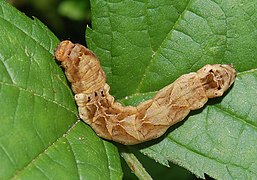Peach blossom
| Peach blossom | |
|---|---|

| |
| Scientific classification | |
| Domain: | Eukaryota |
| Kingdom: | Animalia |
| Phylum: | Arthropoda |
| Class: | Insecta |
| Order: | Lepidoptera |
| Family: | Drepanidae |
| Genus: | Thyatira |
| Species: | T. batis
|
| Binomial name | |
| Thyatira batis | |
| Synonyms | |
| |
The peach blossom (Thyatira batis) is a moth of the family Drepanidae. It was first described by Carl Linnaeus in his 1758 10th edition of Systema Naturae.[1]
It is found throughout Europe and east through the Palearctic to Japan and Mongolia. It is a fairly common species in the British Isles.
It is a striking species with brown forewings marked with five pink and white blotches which do rather resemble the petals of peach blossom. The hindwings are buff and grey. The wingspan is 40–45 mm. The species flies at night, in western Europe in June and July sometimes with a partial second brood emerges in late August and September. The species is attracted to light and sugar.
-
Both sides MHNT
-
Caterpillar
-
Pupa
The larva is brown with white markings and several humps along its back. At rest it raises both ends as with many drepanids. It feeds on various Rubus species. The species overwinters as a pupa.
- ^ The flight season refers to the British Isles. This may vary in other parts of the range.
Subspecies
- Thyatira batis batis (Russia, Mongolia, Japan, Turkey, Iran, Caucasus, Algeria, Europe, China: Heilongjiang, Jilin, Inner Mongolia, Beijing, Hebei, Shaanxi, Gansu, Xinjiang)
- Thyatira batis formosicola Matsumura, 1933 (Taiwan)
- Thyatira batis pallida (Rothschild, 1920) (Sumatra)
- Thyatira batis rubrescens Werny, 1966 (India, Nepal, Vietnam, China: Henan, Shaanxi, Anhui, Zhejiang, Hubei, Jiangxi, Hunan, Fujian, Guangdong, Guangxi, Hainan, Sichuan, Guizhou, Yunnan, Tibet)[2]
References

- ^ Savela, Markku. "Thyatira batis (Linnaeus, 1758)". Lepidoptera and Some Other Life Forms. Retrieved September 12, 2018.
- ^ "Thyatira batis Linnaeus, 1758". ala.org.au. Retrieved 2020-03-13.
- Chinery, Michael Collins Guide to the Insects of Britain and Western Europe 1986 (Reprinted 1991)
- Skinner, Bernard Colour Identification Guide to Moths of the British Isles 1984
External links
 Media related to Thyatira batis at Wikimedia Commons
Media related to Thyatira batis at Wikimedia Commons Data related to Thyatira batis at Wikispecies
Data related to Thyatira batis at Wikispecies- Peach Blossom at UKMoths
- Lepiforum.de



